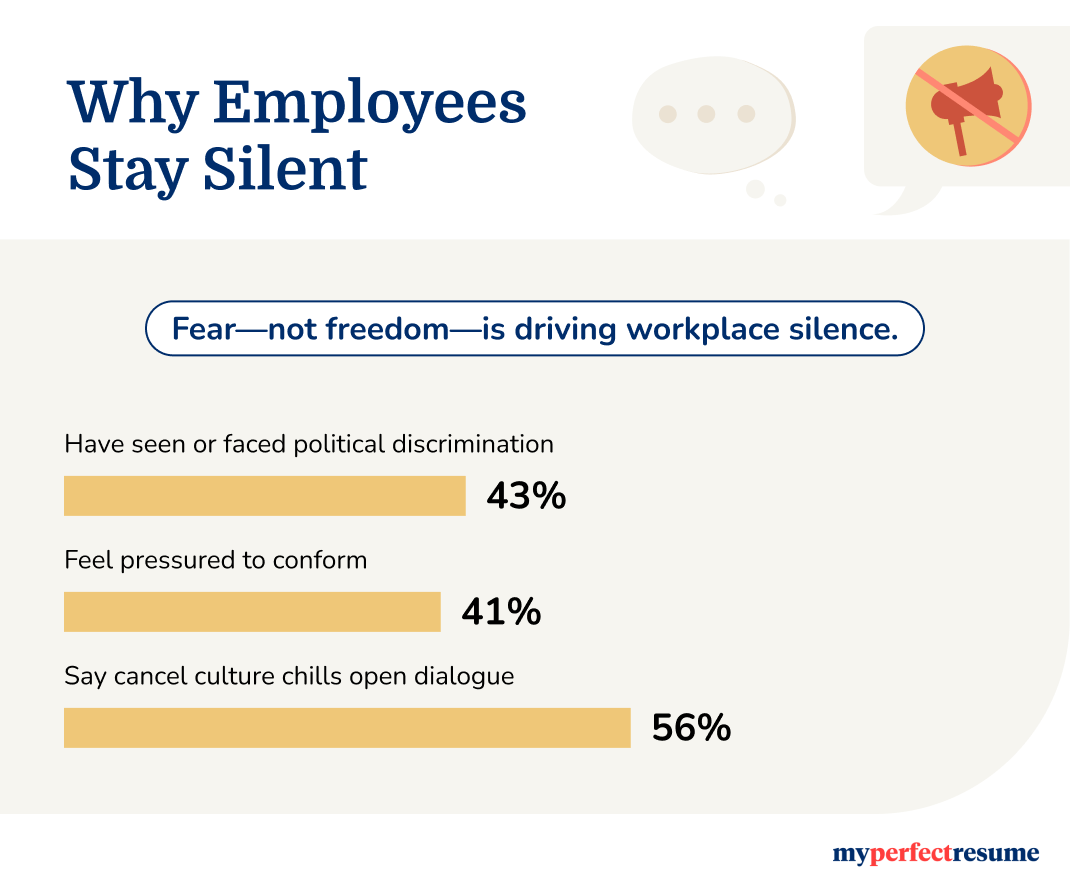Our customers have been hired at: *Foot Note
Table of Contents
Get started with MyPerfectResume today!
- Build a resume on any device
- Pick an ATS-friendly template
- Tailor with AI copy suggestions
Despite corporate messaging promoting authenticity, most employees are staying silent. A new survey of 1,000 U.S. workers by MyPerfectResume reveals that freedom of expression at work is more aspirational than actual.
The data highlights a stark disconnect between what companies say and how employees feel. While leaders encourage open dialogue, workers say they’re walking on eggshells, especially when it comes to politics.
Key Findings
- Many employees are mindful of how they communicate: 74% say they adjust their communication at work to avoid conflict.
- Political views often stay unspoken: 68% have held back their opinions due to concerns about how their political affiliation might be received.
- Experiences of political bias are not uncommon: 43% have witnessed or experienced some form of discrimination related to political expression in the workplace.
- Employees feel pressure to align with company values: 41% felt pressured to agree with a workplace stance on a social or political issue to fit in or avoid conflict.
- There’s a preference for keeping politics private at work: 63% say political symbols—such as pins, flags, or stickers—shouldn’t be displayed in the workplace.
- Most employees are skeptical about controversial discussions: 34% say workplace discussions about politics, religion, or social issues are disruptive and should be avoided.
- Leadership, not laws, should set the tone: 62% believe company leadership should be responsible for setting boundaries on workplace speech, versus 20% who support external regulations and just 19% who believe speech should be unrestricted.
The Authenticity Gap Is Growing
Despite messaging about “bringing your whole self to work,” only 27% of employees feel comfortable expressing political views. In contrast, 74% say they modify their communication to avoid misunderstandings or backlash.
When broken down by political affiliation, here’s how many people say they’ve stayed quiet to avoid conflict at work:
- 26% of Democrats
- 24% of Independents
- 18% of Republicans
What this means: Corporate culture may claim to welcome diverse voices, but most employees don’t feel safe speaking freely. A culture of caution and calculation has replaced genuine authenticity.
Fear of Backlash Is Shaping Behavior
Workers aren’t simply choosing to stay quiet; they’re responding to what they perceive as real risks:
- 43% have experienced or witnessed discrimination due to political expression.
- 19% personally experienced it.
- 24% witnessed it happen to someone else.
- 41% say they felt pressured to align with company values or risk exclusion.
- 56% believe cancel culture is negatively impacting open dialogue.
Here is a visualization of key data from above:
What this means: Employees are not just uncomfortable; they’re afraid. Many people believe that expressing a wrong view could damage their reputation or even their career.
Workers Are Skeptical of Company Speech Policies
Employees are torn between the ideal of free expression and the need for workplace harmony:
- 82% agree that employees should be able to criticize company policy without fear.
- 44% want more open-speech policies.
- 41% say current policies are acceptable as-is.
- 15% want tighter restrictions to preserve professionalism.
- 34% say controversial conversations are disruptive and should be avoided.
What this means: While workers believe in the right to speak freely, they’re also wary of how that plays out in reality. Most prefer clearly defined, respectful boundaries and communication skills to protect both expression and collegiality.
Silence Over Symbols
Many workers want to keep political expression—visual and verbal—out of the workplace entirely:
- 63% believe political symbols (e.g., buttons, flags, stickers) should not be displayed at work.
- 62% believe company leadership should set the tone for workplace speech.
- Only 20% favor external regulations.
- Just 19% support completely unrestricted speech at work.
What this means: Employees want guidance and consistency. They don’t want politics to dominate their professional environment, and they’re looking to leaders to maintain that balance.
The data tells a clear story: workers are censoring themselves, not because they have nothing to say, but because they’re afraid of the consequences.
While companies continue to preach openness and inclusion, employees read the room and choose to stay silent. In today’s workplace, freedom of speech exists more in theory than in practice.
To foster true expression, companies must create environments where speaking up is not only allowed but genuinely safe.
For press inquiries, contact Nathan Barber at nathan.barber@bold.com.
Survey Methodology
The findings are based on a national survey of 1,000 U.S. employees conducted on May 8, 2025, via Pollfish. The sample comprised a diverse group of full-time, part-time, and contract workers from various industries and political affiliations. The survey explored perceptions of political expression, communication norms, and speech policies in the workplace.
About MyPerfectResume
MyPerfectResume Resume Builder with professional templates is designed to help job seekers elevate their careers. The easy-to-use platform was created to eliminate the hassle of resume writing, offering professionally written examples, free expert tips, step-by-step guidance to make a resume, and valuable interview advice to create an outstanding job application effortlessly. Since 2012, MyPerfectResume's Resume Builder has helped more than 11 million job seekers create their perfect resumes online. Its comprehensive employment surveys have been featured in Forbes, Yahoo! Finance, CNBC, Newsweek, USA Today, BBC, Workable, and more. Stay connected with MyPerfectResume’s latest Facebook, LinkedIn, Instagram, X, and Pinterest updates.
Our customers have been hired at:*Foot Note











